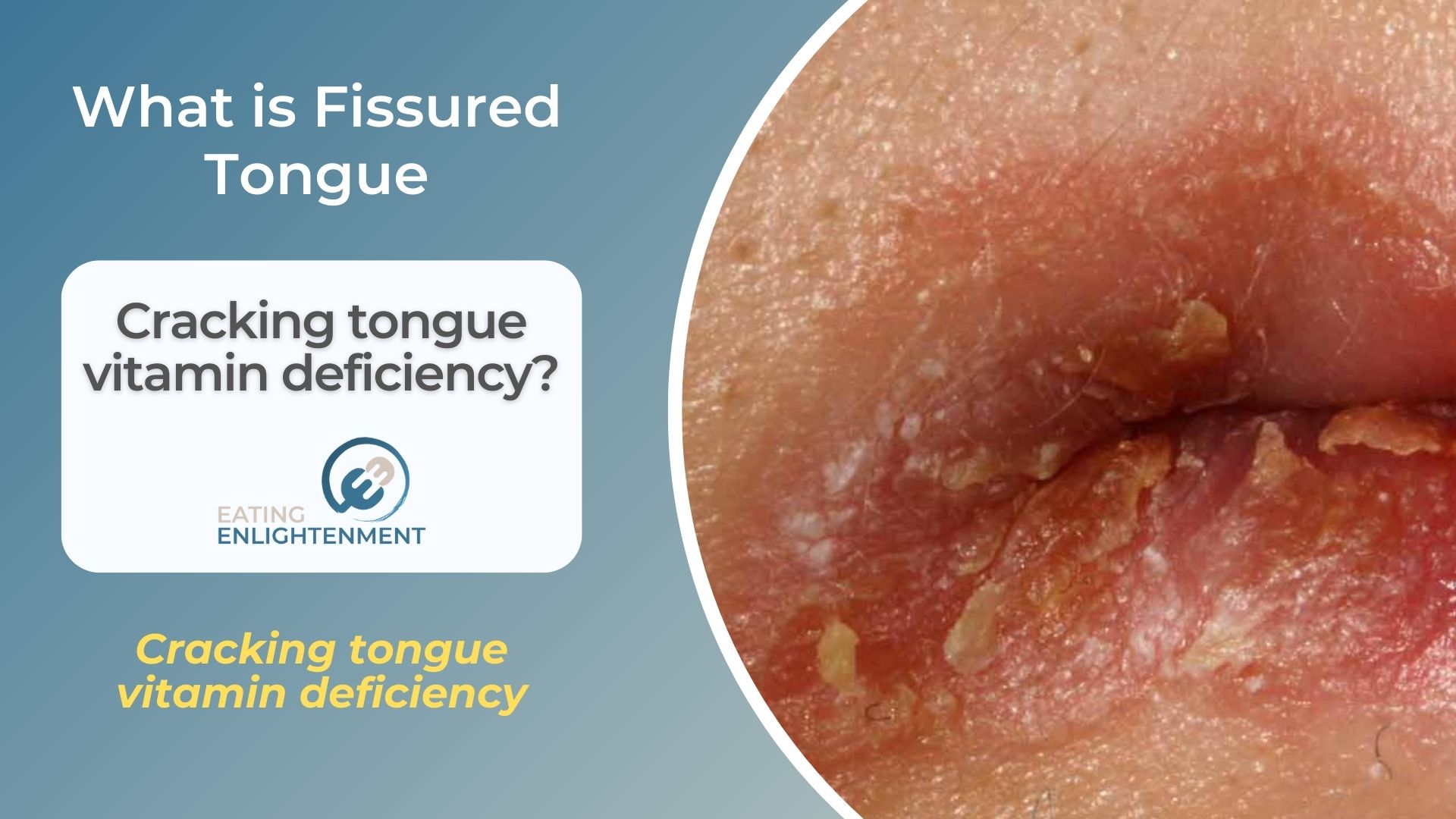Do you often have a sore, dry or itchy feeling in your mouth? Do you sometimes see white patches on the top of your tongue?
If so, you may have fissured tongue. Fissured tongue is a condition that causes deep cracks in the surface of the tongue.
It is a common condition, and it can occur in people of any age. In this blog post, we will discuss the symptoms, causes and treatment options for fissured tongue.
Although fissured tongue is not a serious condition, if you have it and it’s accompanied by other symptoms such as pain or discomfort, you should seek medical care.
What’s Fissured Tongue?

Fissured tongue is a condition that causes deep cracks in the surface of the tongue. The cracks can be painful and make it difficult to eat or talk.
The condition is also known as cracked tongue, grooved tongue, or scrotal tongue. It is a common condition, and it can occur in people of any age.
Fissured tongue is not contagious and it is not cancerous. The condition is often harmless, but it can sometimes be a sign of an underlying medical condition.
What a Fissured Tongue Looks Like
If you have a cracked tongue, you’ll notice visible cracking on the dorsal surfaces. Dorsal Surface is the upper surface that usually comes into contact with your teeth is covered with small bumps and taste buds.
Some individuals do not experience the same mental health symptoms as others. The source of the discomfort can be at any place on the body, but it is usually concentrated in one limb.
It might spread from the center out to the back or there may appear many separate fissures on the dorsal surface.
What is Pustular Psoriasis?
Pustular psoriasis is a rare form of psoriasis that causes pus-filled blisters to form on the skin. It can be a painful and frustrating condition.
There is no cure for pustular psoriasis, but there are treatments that can help to control the symptoms.
If you have pustular psoriasis, it is important to see a doctor so that you can get the appropriate treatment.
Read here for more info about Postular psoriasis.
Cracked Tongue Causes
The cause of fissured tongue is not fully understood. It is thought to be a genetic condition, as it often runs in families.
Certain medical conditions, such as diabetes, psoriasis and vitamin deficiencies, can also cause cracked tongue.
Smoking is a risk factor for fissured tongue. People who smoke are more likely to develop the condition than people who do not smoke.
Cracked Tongue Symptoms
The most common symptom of fissured tongue is cracks in the surface of the tongue. These cracks can be painful and make it difficult to eat or talk.
Other symptoms of fissured tongue include:
- sore throat
- dry mouth
- bad breath
- difficulty eating certain foods
- tongue pain
- burning sensation on the tongue.
Winkles on the tongue
Wrinkles on the tongue, a map-like appearance, or fissures (cracks) on the tongue can be benign.
They are commonly seen in healthy individuals and usually do not cause any symptoms. Cracked tongue is often harmless, but it can sometimes be a sign of an underlying medical condition.
Burning sensations
A burning sensation on the tongue can be a symptom of fissured tongue. It can also be a symptom of other conditions, such as oral thrush, geographic tongue, and Burning Mouth Syndrome.
If you have a burning sensation on your tongue, it is important to see a doctor so that they can rule out other causes.
Tongue on fire so why am I craving spicy food? 4 Reasons
Geographic tongue
Geographic tongue is a condition that causes the tongue to have a map-like appearance. It is often harmless, but it can sometimes be a symptom of an underlying medical condition.
If you have geographic tongue, it is important to see a doctor so that they can rule out other causes.
Small patches of white
Small patches of white on the tongue can be a symptom of fissured tongue. It can also be a symptom of other conditions, such as oral thrush, leukoplakia, and erythroplakia.
It’s also possible to have fissured tongue without any symptoms.
If you are concerned about any changes in your mouth, it is important to see a doctor so that they can rule out other conditions.
6 Conditions Associated With Fissured Tongue
Fissures on the tongue are frequently associated with digestive problems, nutritional concerns, or oral health.
Dehydration is a common problem that many people suffer from. It’s quite difficult to acquire dry mouth and cracked lips as a result of dehydration.
This might be caused by one or both conditions, especially if you have chronic cracked tongue or it lasts for several days.
A fissured tongue can also be a symptom of the following conditions:
- geographic tongue
- glossitis
- leukoplakia
- lichen planus
- median rhomboid glossitis (MRG)
- syphilis.
Signs
A fissured tongue is generally only observed. The discomfort is usually minor, and there is no bleeding or drainage.
The first noticeable symptom is the crack itself. This can vary depending on: Usually, fissures appear on tongue that look like they’re disconnected from each other.
Many fissures can be observed on the teeth’s surface, suggesting considerable fractures. Your mid-tongue may have been afflicted, but the problem might also occur elsewhere.
Cracks in the tongue can make it feel rough when you touch it with your fingers.
The fissures may also produce a burning or stinging feeling, especially when eating spicy foods or drinking hot beverages.
You might also have trouble taste certain things, such as sweet foods. Some people develop a sore throat from the fissures.
Vitamin Deficiency Symptom Chart: What to Know
Treatments for Tongue Cracks
There is no specific cure for fissured tongue. The condition is usually not painful and does not require treatment.
However, if the cracks in your tongue are causing pain or discomfort, there are a few things you can do to help relieve your symptoms along with oral medicine.
You can try the following home remedies:
- Brushing your tongue with a soft toothbrush
- Rinsing your mouth with warm salt water
- Sucking on ice chips or popsicles
- Avoiding spicy, hot, or acidic foods
- Using a humidifier to keep your mouth moist.
If home remedies do not help your fissured and burning tongue, your doctor may prescribe medication to help relieve your symptoms.
They may also recommend using a topical cream or ointment to help heal the cracks in your tongue.
In severe cases, surgery may be necessary to remove the fissures. But it’s not the case in the most cases.
Depending on the issue, you may need to visit an ENT specialist or a dentist. To find one, you can search for a term like “dentist near me stafford” or “ent near me”. Doing so should give you a list of professionals that you can easily reach out to.
Prevention
You can help prevent tongue cracks by:
- Practicing good oral hygiene
- Brushing your teeth twice a day with fluoride toothpaste
- Flossing daily
- Using a mouthwash to help keep your mouth clean and free of bacteria
- Avoiding tobacco products
- Limiting alcohol intake
Vitamin Supplements
Cracked tongue fissures can also be a symptom of vitamin B12 deficiency. Vitamin B12 is important for the health of your nerves and red blood cells. A lack of vitamin B12 can cause anemia, fatigue, and weakness.
If you think you might have a vitamin B12 deficiency, talk to your doctor. They can order a blood test to check your levels and recommend treatment options.
Cracks in the tongue can also be a sign of other deficiencies, such as iron or folate.
If you are concerned about any changes in your mouth, it is important to see a doctor so that they can rule out other conditions.
You may also place an order for online blood tests to see if you’re lacking in Vitamin B12. And once you know, you may also take Vitamin B12 supplements to cure this problem.
Conclusion
If you have fissured tongue, there is no need to worry. In most cases, it is not painful and does not require treatment.
However, if the cracks in your tongue are causing pain or discomfort, there are a few things you can do to help relieve your symptoms.
You can try home remedies such as brushing your tongue with a soft toothbrush, rinsing your mouth with warm salt water, sucking on ice chips or popsicles, and avoiding spicy food, hot, or acidic foods.
And in case home remedies do not help your oral health issues, your doctor may prescribe medication to help relieve your symptoms.
In severe health conditions, surgery may be necessary to remove the fissures. You can help prevent fissured tongue by practicing good oral hygiene and avoiding tobacco products.
If you think you might have a vitamin B12 deficiency, you can take supplements. Cracks in the tongue can also be a sign of other deficiencies, such as iron or folate.
And if you are concerned about any changes in your mouth and other oral health issues, it is important to see a doctor so that they can rule out other conditions.



